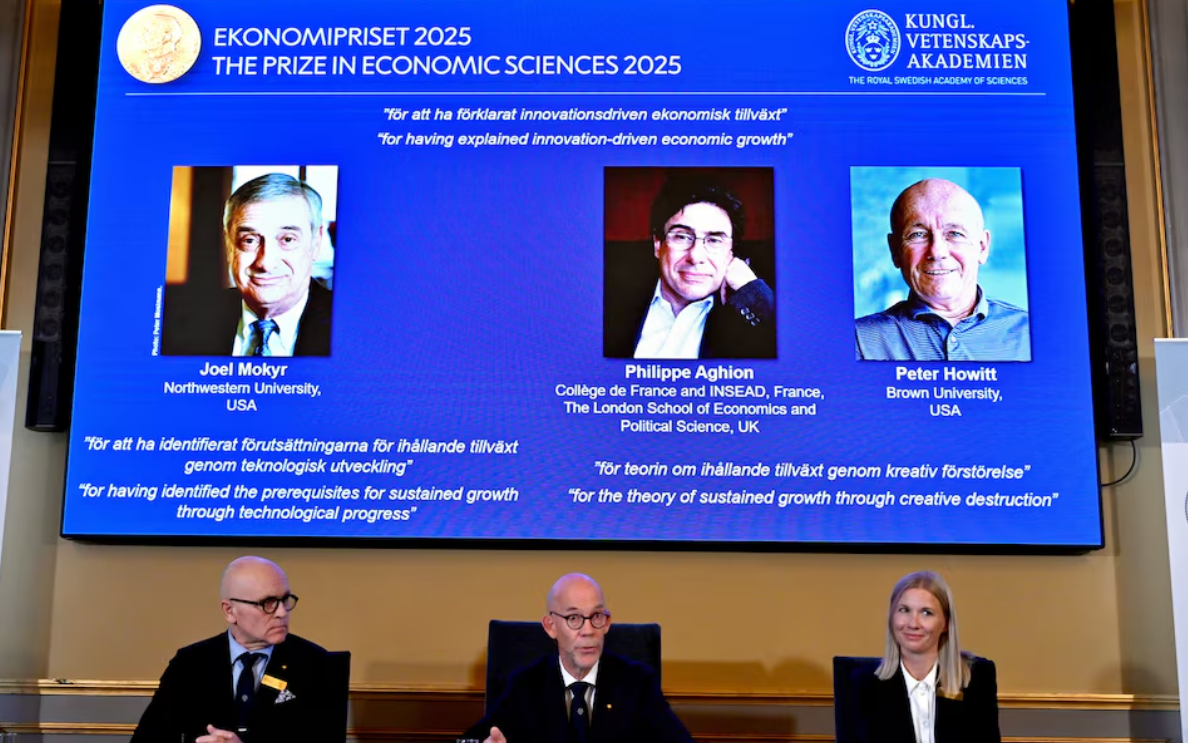
(L-R) Joel Mokyr, Philippe Aghion and Peter Howitt win the 2025 Nobel economics prize. Photo: AFP
Their insights offer more than just historical or theoretical value, but they provide timely and practical lessons for Vietnam as it navigates a critical transition toward a knowledge- and productivity-based economy.
‘Creative destruction’ is a key concept in economics that refers to the process in which beneficial innovations replace – and thus destroy – older technologies and businesses.
Mokyr, an economic historian and professor at Northwestern University in the United States, has long pondered a deceptively simple question: Why did Western nations industrialize and prosper, while others lagged behind?
His answer lies in what he calls ‘useful knowledge,' the ability to transform scientific understanding into technology, products, and ultimately, higher productivity.
For Mokyr, knowledge must be activated, not locked away in books but transferred into practice.
He highlights the role of both transformative ‘macro-inventions’ like steam engines, the Internet, or AI, and countless ‘micro-inventions’ made by craftsmen, engineers, and workers.
This steady stream of incremental improvement, rather than occasional breakthroughs, sustains long-term growth.
Successful societies are those that foster a culture of learning, debate, and collaboration, bridging academia, workshops, and business.
Countries like the UK, the Netherlands, and later the U.S. created such communities where ideas flowed freely, unhindered by silos between science, technology, and commerce.
While Mokyr delved into long-term trends using historical sources, Aghion, a professor at the College de France and INSEAD in Paris and at the London School of Economics and Political Science, and Howitt, a professor at Brown University in the United States, relied on mathematics to explain how creative destruction works.
Building on Joseph Schumpeter’s concept of creative destruction, they developed a dynamic model of economic growth driven by innovation.
In their framework, firms do not just compete on price, but on innovation.
The ones that innovate leap ahead.
Yet, innovation must strike a balance: too little competition breeds stagnation; too much deters investment.
Their ideal economic policy encourages new entrants while giving pioneers time to reap the rewards of their innovations.
Aghion and Howitt emphasize that a country's position relative to the global technological frontier determines its optimal growth strategy.
Advanced economies like the U.S., Japan, or South Korea should focus on rapid innovation, risk-taking, and fast experimentation.
In contrast, countries like Vietnam, still distant from the technological frontier, must prioritize absorbing existing knowledge by investing in skilled labor, improving corporate governance, and adopting available technologies effectively.
Lessons for Vietnam
Vietnam is undergoing a major shift, restructuring its growth model and reforming institutions in pursuit of a more innovation-driven economy.
The Nobel-winning insights of Mokyr, Aghion, and Howitt arrive at a pivotal moment and serve as guidance for the nation’s future development.
Many Vietnamese enterprises remain stuck in low-value-added manufacturing, reliant on cheap labor rather than technology or ideas.
Fear of risk discourages innovation, while safety nets for those left behind are lacking, and support systems for startups are shallow.
Therefore, this kind of creative destruction has yet to take root.
A dynamic economy must allow individuals and firms to change quickly, with less cost and less fear.
To enable this, Vietnam needs a coordinated and consistent policy framework focused on lowering the cost of change, not delaying it.
Particularly, it is necessary to introduce a flexible social welfare system so that workers can retrain and transition to new jobs as technology evolves.
Also, investment funds and favorable credit mechanisms should be offered to innovative, especially small- and medium-sized, enterprises.
Besides, the nation should issue stronger intellectual property rights to encourage innovation while curbing imitation.
Furthermore, a fair and competitive market is needed, while rent-seeking, privilege, and inertia must be phased out.
The 2025 Nobel message also highlights a critical gap for Vietnam: the capacity to absorb and apply knowledge.
For countries distant from the global technology frontier, success does not hinge on creating unicorns, but on enabling millions of SMEs to learn, test, and improve continuously.
Each business must become a learning organization, where small innovations accumulate into large productivity gains.
This requires robust links between universities, research institutes, tech parks, and the business community, forming an open knowledge ecosystem where ideas, data, and talent flow freely, unimpeded by red tape or monopolies.
Vietnam is laying promising institutional tracks with policies on science and technology, international integration, private sector development, and legal reforms.
However, accelerating growth requires bolstering innovation through a mindset that embraces experimentation, accepts failure, and values continuous learning.
Vietnam will only truly enter the era of innovation-led growth when change is no longer associated with loss, but seen as a chance to advance.



Max: 1500 characters
There are no comments yet. Be the first to comment.